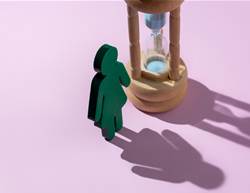These days, you can barely turn on the telly without seeing an ad aimed at men suffering from “low T.” But it’s not just men looking to boost their testosterone—many postmenopausal women are jumping on the bandwagon too. While men naturally have higher levels, testosterone is not just a “male hormone”—it’s a human hormone and it’s just as important for women.
Like men, women’s testosterone levels decline with age. But there’s plenty of debate around whether giving women testosterone actually offers any real benefits. Why? Simply put, just because testosterone levels fall over time doesn’t mean topping them up will automatically help.
Before you ask your doctor about a prescription, here are a few important things to know.
Could testosterone boost your libido?
Maybe. There’s robust data showing that testosterone supplements are generally safe for postmenopausal women, but only about 50% of women notice a meaningful increase in sex drive. While testosterone plays a key role in desire, it’s not the only factor. Libido is influenced by neurotransmitters, genital blood flow and the ability to experience pleasure.
Other things can also impact sexual desire—like painful sex, stress, medications, poor sleep, illness and even long-term monogamy. So, while testosterone supplementation might help, it’s not a guaranteed or catch-all fix.
Should you take it to build bone and muscle?
Probably not. There are few high-quality studies on the effect of testosterone on muscle and bone strength in postmenopausal women who receive physiological doses—that is, amounts similar to what the body used to produce. The results are mixed.
Bodybuilders who use testosterone often gain muscle and bone density and lose body fat—but they’re using doses much higher than what a doctor would prescribe. The goal of prescribed testosterone in women is to restore youthful levels, not exceed them. Taking too much can cause a range of unwanted side effects.
OK, what about mood and brain benefits?
The jury is still out. While some studies—and plenty of anecdotal reports—suggest it might help, there isn’t enough strong evidence to support the use of testosterone to delay cognitive decline, treat depression or improve mental wellbeing more broadly.
Are there any side effects?
Potential side effects include acne, increased facial and body hair, male-pattern hair thinning and oily skin. Taking too much testosterone can lead to irreversible effects like voice deepening or clitoral enlargement.
Most women stop taking testosterone not because of side effects but because they don’t notice a benefit. Unlike oestrogen therapy, which typically doesn’t require routine blood tests, testosterone treatment does—you’ll need regular checks to ensure your levels are within a safe and effective range.
What’s the best way to get a prescription for it?
If you’re interested in trying testosterone to help with libido, it’s important to know that there are currently no testosterone products approved for women available commercially. The testosterone medications on the market are approved for men only. That means any use in women is considered “off-label.”
Since women typically require around one-tenth of the male dose, you’ll need to work with a healthcare provider who either partners with a reputable compounding pharmacy or can appropriately adjust a male-prescribed dose to suit a woman’s needs.
How does one take testosterone?
Here are the most common ways testosterone is prescribed for women:
Testosterone pellets are widely used, and many women speak highly of them—but they’re not recommended by most menopause specialists. Initially, women often love the way pellets make them feel—energised, sexy and generally great—due to the strong dose of oestrogen and testosterone they deliver. But this can lead to excessively high hormone levels, since the dosages are often too strong and the products aren’t well regulated. IMost women who experience side effects are using pellets. Pellets or injections are not recommended by most academic experts in menopause care.
Testosterone gels or creams applied to the skin are currently considered the safest and most effective delivery method for women. Because there are no TGA-approved products specifically formulated for women, they often prescribe transdermal gels from a trusted compounding pharmacy. Sourcing testosterone from a reputable, regulated provider is essential.
Commercial testosterone products for men can also be prescribed to women in very low doses, but only under the supervision of a qualified health professional. These products are regulated, which is an advantage, but the dosage women need is minimal. It is used as a product designed for men, hence, it can be difficult to measure out such a small and precise amount.
Dietary supplements should be approached with caution. These are designed to support the diet and are not intended to treat, diagnose, prevent or cure medical conditions. If you’re pregnant or breastfeeding, speak with your GP before taking supplements. Also, avoid giving them to children unless specifically advised by a healthcare professional.



.jpg&h=90&w=90&c=1&s=1)





.png&h=193&w=250&c=1&s=1)
